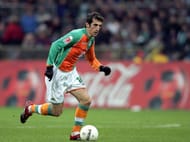Blessed with excellent vision, an impressive passing range and good spatial awareness, Toni Kroos is one of the fastest improving talents in the game today.
The 27-year-old German international is an underrated personality at the heart of the Real Madrid midfield, covering Los Blancos’ back-line, and simultaneously providing for the club’s lethal frontmen.
Also read: The golden fruit of the German youth system - Toni Kroos
There is, however, probably some Toni trivia you’re not fully aware of. As a testament to the midfielder’s shirt number for the Spaniards, here are eight facts you didn’t know about Kroos:
#1 The youngest player ever to represent Bayern Munich professionally
In his youth career, Kroos plied his trade for Greifswalder SV and Hansa Rostock, before joining the Bayern Munich contingent at 16. A year or so later and the German was given a chance with the first-team and he made history for the Bavarians by becoming the youngest player to represent them professionally, at 17 years, 8 months and 22 days.
It wasn’t just a case of making up the numbers for Toni either, as the former-Munich maestro made two assists after replacing Ze Roberto in midfield, in a game that Bayern went on to win 5-0.
#2 Second most valuable German in the world
Yes, that’s at least according to the website ‘TransferMarkt’ who attributed Kroos with a current estimated value of £51 million, making him supposedly more valuable than the likes of Manuel Neuer, Mats Hummels, Marco Reus and Jerome Boateng. Thomas Müller is the only German worth more than Kroos, with the Bayern Munich forward valued at £64 million.
That makes Kroos the joint-thirteenth most valuable player in world football. However expensive you’d deem the midfielder to be, there’s no denying Real Madrid picked up a brilliant bargain three years ago, when he cost them just a little over £25 million.
#3 2014 was the ‘Year of Kroos’
Mesut Özil has just picked up another ‘German Player of the Year’ award and the last player to secure the prestigious title was Kroos back in 2014. In that year, Kroos not only secured his move to the Galacticos, but his trophy haul was also unprecedented.
The German won five trophies in total with three different teams. He bid farewell to Bayern Munich with a Bundesliga title and DFB Pokal success, before lifting the World Cup in Brazil with Germany in a competition he lit up from midfield. Just a few months into his Real Madrid tenure and Kroos added UEFA Super Cup and FIFA Club World Cup successes to an already crammed cabinet.
#4 He’s nicknamed ‘Garcon’ or ‘The Waiter’
This title was first thrown around in the wake of Germany’s 2014 World Cup encounter with Portugal. Kroos’ team dismantled the Portuguese 4-0 in the group game, with Thomas Müller bagging a hat trick. His performance was undoubtedly phenomenal but the more perceptive football follower would’ve recognised that it would not have been possible without the services of Toni Kroos.
The Madrid Magician attempted 79 passes in total, completing 76 of them successfully, giving him a more-than-admirable pass completion rate of 96%. Pundits became increasingly aware of Kroos’ midfield prowess from this point onwards and the nickname is appropriate for a player who rarely fails to deliver the goods.
#5 His hero was Frenchman Johan Micoud
By no means a ‘household’ name in the sport, but it’s perhaps from this idolisation that Kroos’ playing style stems. The former-Werder Bremen player occupied a similar position on the pitch to Kroos, who claims to have admired the Frenchman’s ‘calm and composed’ nature on the ball.
These are certainly traits which have translated to how tenacious Toni plays his game and the 27-year-old revealed that he was such a fond admirer of Micoud, that his first ever jersey had his name and number printed on the back of it.
#6 His younger brother Felix shows that football runs in the family
Still sadly in the shadows of his successful brother’s omnipotent glow, Felix Kroos has found the ladder to footballing greatness a lot more slippery than Toni. Formerly of Werder Bremen, 25-year-old Felix struggled to nail down a regular starting spot in holding midfield and transferred to Union Berlin for €500,000 last summer.
His list of accolades is very meagre indeed compared to his older sibling, but he did win the 2007 ‘Talent of the Year’ award in Mecklenburg-Vorpommen and has exhibited great versatility in his career, having started out as a frontman, but having played as far back as centre-half to get game time in his career.
#7 He’s the first East German to have won the World Cup
For many this comes as a surprise, but it’s not really when you consider 2014 was a German national team’s first World Cup triumph since the country was reunified in 1990 and that prior to that East Germany was pretty useless on the international stage compared to its Western neighbours.
Kroos was the only individual in the whole 2014 winning squad who was born in East German territory; he comes from Greifswald, Mecklenburg-Vorpommen. When presented with the fact, Kroos himself seemed equally astonished, questioning, “Am I really the only one? I am not as much in touch with those times as my parents.”
#8 His father was his first coach
Roland Kroos, father of Toni and Felix, may have originally been a professional wrestler, but he is now set on football coaching and it all began with his two sons at Greifswalder SC. Kroos talks of his childhood with fond memories of running and training constantly with his brother and father, who is now a youth coach for another of Toni’s former clubs, Hansa Rostock.
Growing up, it is believed that Toni was never thought of as a gifted footballer but instead sought success through hard work both on the pitch and off of it at school. This attitude ultimately came from his father’s electric work ethic.

